新视野第二册课文翻译
新视野英语第二版第二册课后翻译

Unit 11.?房子着火了,里面的人面临着死亡的危险。
(in danger of)The house was on fireand the people inside were in danger of losing their lives.2.?他买不起这么好的房子。
(afford to do)He cannot afford tobuy such a nice house.3.?这个主意听起来也许有些怪,不过还真有点道理。
(make sense)Although this idea maysound strange, it does make sense.4.?约翰看起来是个好人。
即便如此,我还是不信任他。
(even so)John seems (to be) anice person. Even so, I don’t trust him.5. Even though thefirst McDonald’s restaurant sold only hamburgers and French fries, it stillbecame a cultural symbol.虽说第一家麦当劳餐馆只售汉堡包和薯条,它还是成为了一种文化象征。
6. These people areangry that the building is now in danger of being destroyed, along with theirmemories.这些人想到餐馆连同他们的美好回忆一起将被摧毁,感到很气愤。
7. They are using theearthquake as an excuse.他们在利用那次地震作借口。
8. Some think thatMcDona ld’s real reason for wanting to close down the restaurant has nothing todo with money.有人认为麦当劳想关闭这家餐馆的真正原因与金钱无关。
新视野大学英语第三版第二册读写课文翻译
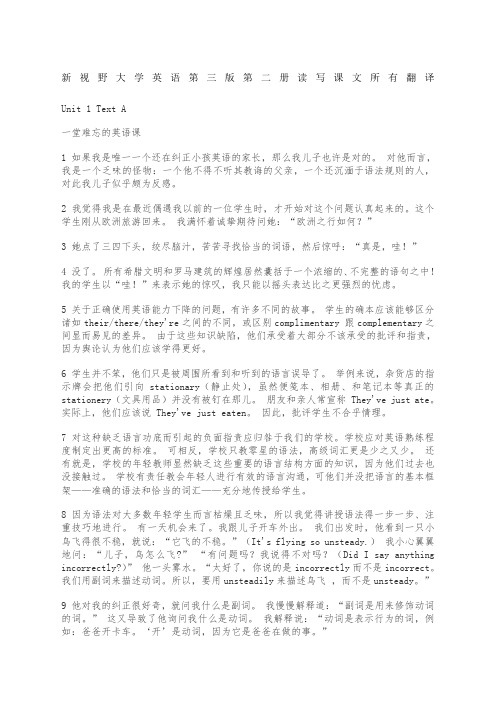
新视野大学英语第三版第二册读写课文所有翻译Unit 1 Text A一堂难忘的英语课1 如果我是唯一一个还在纠正小孩英语的家长,那么我儿子也许是对的。
对他而言,我是一个乏味的怪物:一个他不得不听其教诲的父亲,一个还沉湎于语法规则的人,对此我儿子似乎颇为反感。
2 我觉得我是在最近偶遇我以前的一位学生时,才开始对这个问题认真起来的。
这个学生刚从欧洲旅游回来。
我满怀着诚挚期待问她:“欧洲之行如何?”3 她点了三四下头,绞尽脑汁,苦苦寻找恰当的词语,然后惊呼:“真是,哇!”4 没了。
所有希腊文明和罗马建筑的辉煌居然囊括于一个浓缩的、不完整的语句之中!我的学生以“哇!”来表示她的惊叹,我只能以摇头表达比之更强烈的忧虑。
5 关于正确使用英语能力下降的问题,有许多不同的故事。
学生的确本应该能够区分诸如their/there/they're之间的不同,或区别complimentary 跟complementary之间显而易见的差异。
由于这些知识缺陷,他们承受着大部分不该承受的批评和指责,因为舆论认为他们应该学得更好。
6 学生并不笨,他们只是被周围所看到和听到的语言误导了。
举例来说,杂货店的指示牌会把他们引向stationary(静止处),虽然便笺本、相册、和笔记本等真正的stationery(文具用品)并没有被钉在那儿。
朋友和亲人常宣称 They've just ate。
实际上,他们应该说 They've just eaten。
因此,批评学生不合乎情理。
7 对这种缺乏语言功底而引起的负面指责应归咎于我们的学校。
学校应对英语熟练程度制定出更高的标准。
可相反,学校只教零星的语法,高级词汇更是少之又少。
还有就是,学校的年轻教师显然缺乏这些重要的语言结构方面的知识,因为他们过去也没接触过。
学校有责任教会年轻人进行有效的语言沟通,可他们并没把语言的基本框架——准确的语法和恰当的词汇——充分地传授给学生。
新视野大学英语(第二版)读写教程第二册课后翻译及原文

新视野大学英语(第二版)读写教程第二册课后翻译及原文-CAL-FENGHAI.-(YICAI)-Company One1Unit 11她连水都不愿喝一口,更别提留下来吃饭了。
1.She wouldn't take a drink, much less would she stay for dinner.2他认为我在对他说谎,但实际上我讲的是实话。
2.He thought I was lying to him,whereas I was telling the truth.3这个星期你每天都迟到,对此你怎么解释?3.How do you account for the fact that you have been late every day this week?4他们利润增长的部分原因是采用了新的市场策略。
4.The increase in their profits is due partly to their new market strategy.5这样的措施很可能会带来工作效率的提高。
5.Such measures are likely to result in the improvement of work efficiency.6我们已经在这个项目上投入了大量的时间和精力,所以我们只能继续。
6.We have already poured a lot of time and energy into the project, so we have to carry on.Unit 21尽管她是家里的独生女,她父母也从不溺爱她。
1.Despite the fact that she is the only child in her family, she is never babied by her parents.2迈克没来参加昨晚的聚会,也没给我打电话做任何解释。
2.Mike didn't come to the party last night, nor did he call me to give an explanation. 3坐在他旁边的那个人确实发表过一些小说,但绝不是什么大作家。
新视野大学英语读写教程第二版第二册课文及翻译
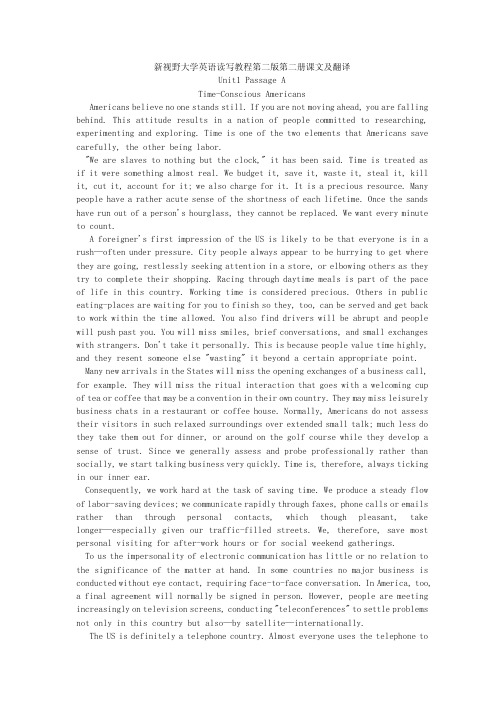
新视野大学英语读写教程(第二版)第二册课文及翻译
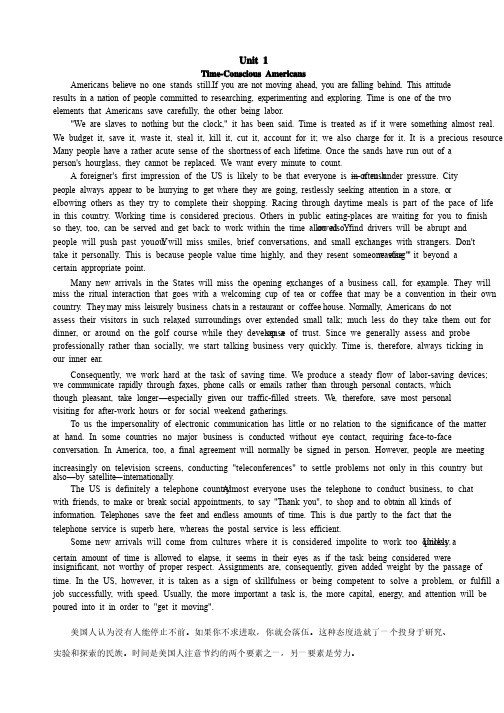
Unit 1Time-Conscious AmericansAmericans Americans believe believe believe no no no one stands still. one stands still. I f If If you you you are are are not not not moving moving moving ahead, ahead, ahead, you you you are are are falling falling falling behind. behind. behind. This This This attitude attitude results results in in in a a a nation nation nation of of of people people people committed committed committed to to to researching, researching, researching, experimenting experimenting experimenting and and and exploring. exploring. exploring. Time Time Time is is is one one one of of of the the the two two elements that Americans save carefully, the other being labor. "We are slaves to nothing but the clock," it has been said. Time is treated as if it were something almost real. We budget it, save it, waste it, steal it, kill it, cut it, account for it; we also charge for it. It is a precious resource Many Many people people people have have have a a a rather rather rather acute acute acute sense sense sense of of of the shortness the shortness of of each each each lifetime. lifetime. lifetime. Once Once Once the the the sands sands sands have have have run run run out out out of of of a a person's hourglass, they cannot be replaced. We want every minute to count. A foreigner's first impression of the US is likely to be that everyone is in a rush —often under pressure. City people people always always always appear appear appear to to to be be be hurrying hurrying hurrying to to to get get get where where where they they they are are are going, going, going, restlessly restlessly restlessly seeking seeking seeking attention attention attention in in in a a a store, store, store, or or elbowing others as they try to complete their shopping. Racing through daytime meals is part of the pace of life in this country. Working time is considered precious. Others in public eating-places are waiting for you to finish so they, too, can be served and get back to work within the time allowed. Y ou also find drivers will be abrupt and people will push past you. Y ou will miss smiles, brief conversations, and small exchanges with strangers. Don't take it personally. This is because people value time highly, and they resent someone else "wasting" it beyond a certain appropriate point. Many new arrivals in the States will miss the opening exchanges of a business call, for example. They will miss the ritual interaction that goes with a welcoming cup of tea or coffee that may be a convention in their own country . They may may miss miss miss leisurely leisurely leisurely business chats business chats in in a a a restaurant restaurant restaurant or coffee or coffee house. house. Normally, Normally, Normally, Americans Americans Americans do do do not not assess their visitors in such relaxed surroundings over extended small talk; much less do they take them out for dinner, or around on the golf course while they develop a sense of trust. Since we generally assess and probe professionally rather than socially, we start talking business very quickly. Time is, therefore, always ticking in our inner ear. Consequently, we work hard at the task of saving time. We produce a steady flow of labor-saving devices; we we communicate communicate communicate rapidly rapidly rapidly through through through faxes, faxes, faxes, phone phone phone calls calls calls or or or emails emails emails rather rather rather than than than through through through personal personal personal contacts, contacts, contacts, which which though though pleasant, pleasant, pleasant, take take take longer longer longer——especially especially given given given our our our traffic-filled traffic-filled streets. streets. W W e, therefore, therefore, save save save most most most personal personal visiting for after-work hours or for social weekend gatherings. To us the impersonality of electronic communication has little or no relation to the significance of the matter at hand. hand. In In In some some some countries countries no major business is conducted conducted without without eye contact, contact, requiring requiring face-to-face conversation. In America, too, a final agreement will normally be signed in person. However, people are meeting increasingly on television screens, conducting "teleconferences" to settle problems not only in this country but also also——by satellite—internationally. The US is definitely a telephone country . Almost everyone uses the telephone to conduct business, to chat with with friends, friends, friends, to to to make make make or or or break break break social social social appointments, appointments, appointments, to to to say say say "Thank "Thank "Thank you", you", you", to to to shop shop shop and and and to to to obtain obtain obtain all all all kinds kinds kinds of of information. information. Telephones Telephones Telephones save save save the the the feet feet feet and and and endless endless endless amounts amounts amounts of of of time. time. time. This This This is is is due due due partly partly partly to to to the the the fact fact fact that that that the the telephone service is superb here, whereas the postal service is less efficient. Some new arrivals will come from cultures where it is considered impolite to work too quickly. Unless a certain certain amount amount amount of of of time time time is is is allowed allowed allowed to to to elapse, elapse, elapse, it it it seems seems seems in in in their their their eyes eyes eyes as as as if if if the the the task task task being being being considered considered considered were were insignificant, not worthy of proper respect. Assignments are, consequently, given added weight by the passage of time. In the US, however, it is taken as a sign of skillfulness or being competent to solve a problem, or fulfill a job successfully, with speed. Usually, the more important a task is, the more capital, energy, and attention will be poured into it in order to "get it moving". 美国人认为没有人能停止不前。
新视野第三版大学英语第二册课文翻译

新视野大学英语第二册读写教程课文翻译Unit 1 Text A An impressive Engli lsesson标题: 一堂难忘的英语课1. 如果我是唯一一个还在纠正小孩英语的家长,那么我儿子也许是对的。
对他而言,我是一个乏味的怪物:一个他不得不听其教诲的父亲,一个还沉湎于语法规则的人,对此我儿子似乎颇为反感。
2. 我觉得我是在最近偶遇我以前的一位学生时,才开始对这个问题认真起来的。
这个学生刚从欧洲旅游回来。
我满怀着诚挚期待问她:“欧洲之行如何?”3. 她点了三四下头,绞尽脑汁,苦苦寻找恰当的词语,然后惊呼:“真是,哇!”4. 没了。
所有希腊文明和罗马建筑的辉煌居然囊括于一个浓缩的、不完整的语句之中!我的学生以“哇!”来表示她的惊叹,我只能以摇头表达比之更强烈的忧虑。
5. 关于正确使用英语能力下降的问题,有许多不同的故事。
学生的确本应该能够区分诸如 their/there/they're 之间的不同,或区别 complimentary 跟complementary 之间显而易见的差异。
由于这些知识缺陷,他们承受着大部分不该承受的批评和指责,因为舆论认为他们应该学得更好。
6. 学生并不笨,他们只是被周围所看到和听到的语言误导了。
举例来说,杂货店的指示牌会把他们引向 stationary(静止处),虽然便笺本、相册、和笔记本等真正的 stationery(文具用品)并没有被钉在那儿。
朋友和亲人常宣称 They've just ate。
实际上,他们应该说 They've just eaten。
因此,批评学生不合乎清理。
7. 对这种缺乏语言功底而引起的负面指责应归咎于我们的学校。
学校应对英语熟练程度制定出更高的标准。
可相反,学校只教零星的语法,高级词汇更是少之又少。
还有就是,学校的年轻教师显然缺乏这些重要的语言结构方面的知识,因为他们过去也没接触过。
学校有责任教会年轻人进行有效的语言沟通,可他们并没把语言的基本框架一一准确的语法和恰当的词汇一一充分地传授给学生。
新视野大学英语读写教程(第二版)第二册课文及翻译
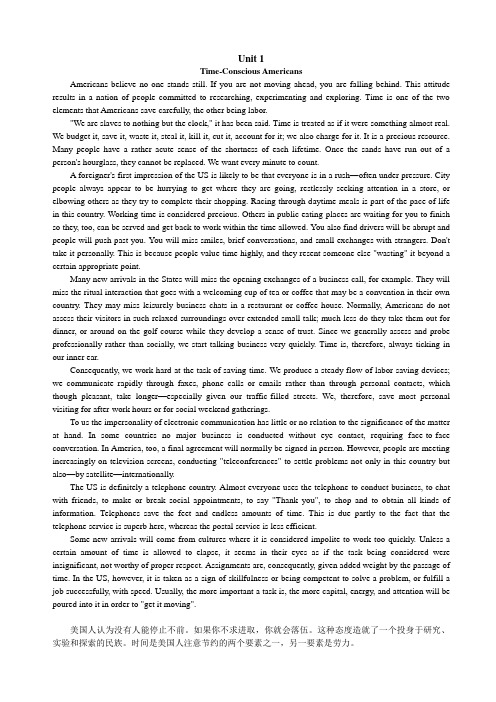
Unit 1Time-Conscious AmericansAmericans believe no one stands still. If you are not moving ahead, you are falling behind. This attitude results in a nation of people committed to researching, experimenting and exploring. Time is one of the two elements that Americans save carefully, the other being labor."We are slaves to nothing but the clock," it has been said. Time is treated as if it were something almost real. We budget it, save it, waste it, steal it, kill it, cut it, account for it; we also charge for it. It is a precious resource. Many people have a rather acute sense of the shortness of each lifetime. Once the sands have run out of a person's hourglass, they cannot be replaced. We want every minute to count.A foreigner's first impression of the US is likely to be that everyone is in a rush—often under pressure. City people always appear to be hurrying to get where they are going, restlessly seeking attention in a store, or elbowing others as they try to complete their shopping. Racing through daytime meals is part of the pace of life in this country. Working time is considered precious. Others in public eating-places are waiting for you to finish so they, too, can be served and get back to work within the time allowed. You also find drivers will be abrupt and people will push past you. You will miss smiles, brief conversations, and small exchanges with strangers. Don't take it personally. This is because people value time highly, and they resent someone else "wasting" it beyond a certain appropriate point.Many new arrivals in the States will miss the opening exchanges of a business call, for example. They will miss the ritual interaction that goes with a welcoming cup of tea or coffee that may be a convention in their own country. They may miss leisurely business chats in a restaurant or coffee house. Normally, Americans do not assess their visitors in such relaxed surroundings over extended small talk; much less do they take them out for dinner, or around on the golf course while they develop a sense of trust. Since we generally assess and probe professionally rather than socially, we start talking business very quickly. Time is, therefore, always ticking in our inner ear.Consequently, we work hard at the task of saving time. We produce a steady flow of labor-saving devices; we communicate rapidly through faxes, phone calls or emails rather than through personal contacts, which though pleasant, take longer—especially given our traffic-filled streets. We, therefore, save most personal visiting for after-work hours or for social weekend gatherings.To us the impersonality of electronic communication has little or no relation to the significance of the matter at hand. In some countries no major business is conducted without eye contact, requiring face-to-face conversation. In America, too, a final agreement will normally be signed in person. However, people are meeting increasingly on television screens, conducting "teleconferences" to settle problems not only in this country but also—by satellite—internationally.The US is definitely a telephone country. Almost everyone uses the telephone to conduct business, to chat with friends, to make or break social appointments, to say "Thank you", to shop and to obtain all kinds of information. Telephones save the feet and endless amounts of time. This is due partly to the fact that the telephone service is superb here, whereas the postal service is less efficient.Some new arrivals will come from cultures where it is considered impolite to work too quickly. Unless a certain amount of time is allowed to elapse, it seems in their eyes as if the task being considered were insignificant, not worthy of proper respect. Assignments are, consequently, given added weight by the passage of time. In the US, however, it is taken as a sign of skillfulness or being competent to solve a problem, or fulfill a job successfully, with speed. Usually, the more important a task is, the more capital, energy, and attention will be poured into it in order to "get it moving".美国人认为没有人能停止不前。
新视野大学英语2全部课文原文中英文翻译

新视野大学英语2全部课文中英文翻译Unit1Americans believe no one stands still. If you are not moving ahead, you are falling behind. This attitude results in a nation of people committed to researching, experimenting and exploring. Time is one of the two elements that Americans save carefully, the other being labor.美国人相信没有人会停滞不前。
如果你不前进,你就落后了。
这种态度造就了一个致力于研究、试验和探索的民族。
时间是美国人谨慎节约的两个要素之一,另一个是劳动。
"We are slaves to nothing but the clock,” it has been said. Time is treated as if it were something almost real. We budget it, save it, waste it, steal it, kill it, cut it, account for it; we also charge for it. It is a precious resource. Many people have a rather acute sense of the shortness of each lifetime. Once the sandshave run out of a person’s hourglass, they cannot be replaced. We want every minute to count.有人说:“我们只是时钟的奴隶。
新视野大学英语读写教程(第二版)第二册课文及翻译

Unit 1Time-Conscious AmericansAmericans believe no one stands still. If you are not moving ahead, you are falling behind. This attitude results in a nation of people committed to researching, experimenting and exploring. Time is one of the two elements that Americans save carefully, the other being labor."We are slaves to nothing but the clock," it has been said. Time is treated as if it were something almost real. We budget it, save it, waste it, steal it, kill it, cut it, account for it; we also charge for it. It is a precious resource. Many people have a rather acute sense of the shortness of each lifetime. Once the sands have run out of a person's hourglass, they cannot be replaced. We want every minute to count.A foreigner's first impression of the US is likely to be that everyone is in a rush—often under pressure. City people always appear to be hurrying to get where they are going, restlessly seeking attention in a store, or elbowing others as they try to complete their shopping. Racing through daytime meals is part of the pace of life in this country. Working time is considered precious. Others in public eating-places are waiting for you to finish so they, too, can be served and get back to work within the time allowed. You also find drivers will be abrupt and people will push past you. You will miss smiles, brief conversations, and small exchanges with strangers. Don't take it personally. This is because people value time highly, and they resent someone else "wasting" it beyond a certain appropriate point.Many new arrivals in the States will miss the opening exchanges of a business call, for example. They will miss the ritual interaction that goes with a welcoming cup of tea or coffee that may be a convention in their own country. They may miss leisurely business chats in a restaurant or coffee house. Normally, Americans do not assess their visitors in such relaxed surroundings over extended small talk; much less do they take them out for dinner, or around on the golf course while they develop a sense of trust. Since we generally assess and probe professionally rather than socially, we start talking business very quickly. Time is, therefore, always ticking in our inner ear.Consequently, we work hard at the task of saving time. We produce a steady flow of labor-saving devices; we communicate rapidly through faxes, phone calls or emails rather than through personal contacts, which though pleasant, take longer—especially given our traffic-filled streets. We, therefore, save most personal visiting for after-work hours or for social weekend gatherings.To us the impersonality of electronic communication has little or no relation to the significance of the matter at hand. In some countries no major business is conducted without eye contact, requiring face-to-face conversation. In America, too, a final agreement will normally be signed in person. However, people are meeting increasingly on television screens, conducting "teleconferences" to settle problems not only in this country but also—by satellite—internationally.The US is definitely a telephone country. Almost everyone uses the telephone to conduct business, to chat with friends, to make or break social appointments, to say "Thank you", to shop and to obtain all kinds of information. Telephones save the feet and endless amounts of time. This is due partly to the fact that the telephone service is superb here, whereas the postal service is less efficient.Some new arrivals will come from cultures where it is considered impolite to work too quickly. Unless a certain amount of time is allowed to elapse, it seems in their eyes as if the task being considered were insignificant, not worthy of proper respect. Assignments are, consequently, given added weight by the passage of time. In the US, however, it is taken as a sign of skillfulness or being competent to solve a problem, or fulfill a job successfully, with speed. Usually, the more important a task is, the more capital, energy, and attention will be poured into it in order to "get it moving".美国人认为没有人能停止不前。
新视野大学英语第三版第二册读写课文翻译
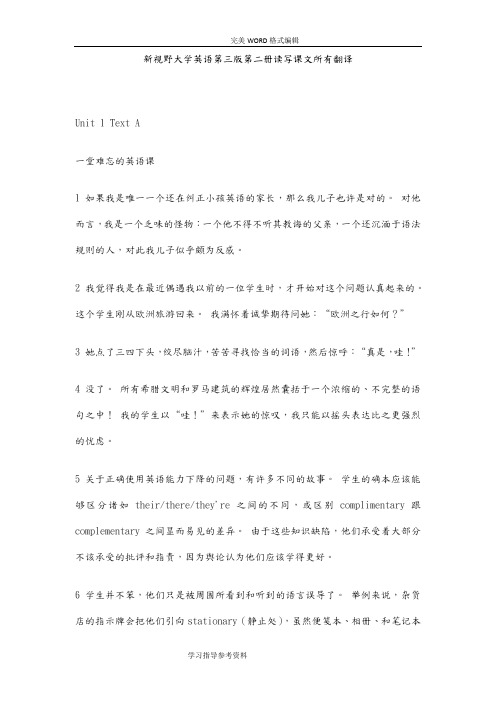
新视野大学英语第三版第二册读写课文所有翻译Unit 1 Text A一堂难忘的英语课1 如果我是唯一一个还在纠正小孩英语的家长,那么我儿子也许是对的。
对他而言,我是一个乏味的怪物:一个他不得不听其教诲的父亲,一个还沉湎于语法规则的人,对此我儿子似乎颇为反感。
2 我觉得我是在最近偶遇我以前的一位学生时,才开始对这个问题认真起来的。
这个学生刚从欧洲旅游回来。
我满怀着诚挚期待问她:“欧洲之行如何?”3 她点了三四下头,绞尽脑汁,苦苦寻找恰当的词语,然后惊呼:“真是,哇!”4 没了。
所有希腊文明和罗马建筑的辉煌居然囊括于一个浓缩的、不完整的语句之中!我的学生以“哇!”来表示她的惊叹,我只能以摇头表达比之更强烈的忧虑。
5 关于正确使用英语能力下降的问题,有许多不同的故事。
学生的确本应该能够区分诸如their/there/they're之间的不同,或区别complimentary 跟complementary之间显而易见的差异。
由于这些知识缺陷,他们承受着大部分不该承受的批评和指责,因为舆论认为他们应该学得更好。
6 学生并不笨,他们只是被周围所看到和听到的语言误导了。
举例来说,杂货店的指示牌会把他们引向stationary(静止处),虽然便笺本、相册、和笔记本等真正的stationery(文具用品)并没有被钉在那儿。
朋友和亲人常宣称They've just ate。
实际上,他们应该说 They've just eaten。
因此,批评学生不合乎情理。
7 对这种缺乏语言功底而引起的负面指责应归咎于我们的学校。
学校应对英语熟练程度制定出更高的标准。
可相反,学校只教零星的语法,高级词汇更是少之又少。
还有就是,学校的年轻教师显然缺乏这些重要的语言结构方面的知识,因为他们过去也没接触过。
学校有责任教会年轻人进行有效的语言沟通,可他们并没把语言的基本框架——准确的语法和恰当的词汇——充分地传授给学生。
新视野大学英语(第三版)读写教程第二册课文翻译

An impressive English lesson一堂难忘的英语课1如果我是唯一一个还在纠正小孩英语的家长,那么我儿子也许是对的。
对他而言,我是一个乏味的怪物:一个他不得不听其教诲的父亲,一个还沉湎于语法规则的人,对此我儿子似乎颇为反感。
2 I think I got serious about this only recently when I ran into one of my former students, fresh from an excursion to Europe. "How was it?" I asked, full of earnest anticipation.我觉得我是在最近偶遇我以前的一位学生时,才开始对这个问题认真起来的。
这个学生刚从欧洲旅游回来。
我满怀着诚挚期待问她:“欧洲之行如何?”3 She nodded three or four times, searched the heavens for the right words, and then exclaimed, "It was, like, whoa!"她点了三四下头,绞尽脑汁,苦苦寻找恰当的词语,然后惊呼:“真是,哇!”4没了。
所有希腊文明和罗马建筑的辉煌居然囊括于一个浓缩的、不完整的语句之中!我的学生以“哇!”来表示她的惊叹,我只能以摇头表达比之更强烈的忧虑。
5关于正确使用英语能力下降的问题,有许多不同的故事。
学生的确本应该能够区分诸如their/there/they’re之间的不同,或区别complimentary跟complementary之间显而易见的差异。
由于这些知识缺陷,他们承受着大部分不该承受的批评和指责,因为舆论认为他们应该学得更好。
6学生并不笨,他们只是被周围所看到和听到的语言误导了。
举例来说,杂货店的指示牌会把他们引向stationary(静止处),虽然便笺本、相册、和笔记本等真正的stationery (文具用品) 并没有被钉在那儿。
新视野大学英语2全部课文原文中英文翻译
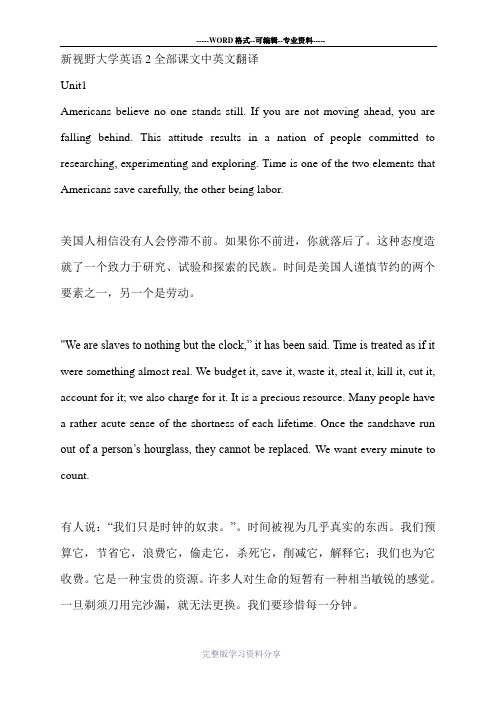
新视野大学英语2全部课文中英文翻译Unit1Americans believe no one stands still. If you are not moving ahead, you are falling behind. This attitude results in a nation of people committed to researching, experimenting and exploring. Time is one of the two elements that Americans save carefully, the other being labor.美国人相信没有人会停滞不前。
如果你不前进,你就落后了。
这种态度造就了一个致力于研究、试验和探索的民族。
时间是美国人谨慎节约的两个要素之一,另一个是劳动。
"We are slaves to nothing but the clock,” it has been said. Time is treated as if it were something almost real. We budget it, save it, waste it, steal it, kill it, cut it, account for it; we also charge for it. It is a precious resource. Many people have a rather acute sense of the shortness of each lifetime. Once the sandshave run out of a person’s hourglass, they cannot be replaced. We want every minute to count.有人说:“我们只是时钟的奴隶。
新视野大学英语第二版第二册读写教程课文翻译

Unit1 Section A 注重时间的美国人Para 1美国人认为没有人能停止不前。
如果你不求进取,你就会落伍。
这种态度造就了一个投身于研究、实验和探索的民族。
时间是美国人注意节约的两个要素之一,另一要素是劳力。
Para 2人们一直说:“只有时间才能支配我们。
”人们似乎把时间当作一个差不多是实实在在的东西来对待。
我们安排时间、节约时间、浪费时间、挤抢时间、消磨时间、缩减时间、对时间的利用作出解释;我们还要因付出时间而收取费用。
时间是一种宝贵的资源,许多人都深感人生的短暂。
时光一去不复返。
我们应当让每一分钟都过得有意义。
Para 3外国人对美国的第一印象很可能是:每个人都匆匆忙忙——常常处于压力之下。
城里人看上去总是在匆匆地赶往他们要去的地方,在商店里他们焦躁不安地指望店员能马上来为他们服务,或者为了赶快买完东西,用肘来推搡他人。
白天吃饭时人们也都匆匆忙忙,这部分地反映出这个国家的生活节奏。
人们认为工作时间是宝贵的。
在公共用餐场所,人们都等着别人尽快吃完,以便他们也能及时用餐,你还会发现司机开车很鲁莽,人们推搡着在你身边去过。
你会怀念微笑、简短的交谈以及与陌生人的随意闲聊。
不要觉得这是针对你个人的,这是因为人们都非常珍惜时间,而且也不喜欢他人“浪费”时间到不恰当的地步。
Para 4许多刚到美国的人会怀念诸如商务拜访等场合开始时的寒暄。
他们也会怀念那种一边喝茶或喝咖啡一边进行的礼节性交流,这也许是他们自己国家的一种习俗。
他们也许还会怀念在饭店或咖啡馆里谈生意时的那种轻松悠闲的交谈。
一般说来,美国人是不会在如此轻松的环境里通过长时间的闲聊来评价他们的客人的,更不用说会在增进相互间信任的过程中带他们出去吃饭,或带他们去打高尔夫球。
既然我们通常是通过工作而不是社交来评估和了解他人,我们就开门见山地谈正事。
因此,时间老是在我们心中滴滴答答地响着。
Para 5因此,我们千方百计地节约时间。
我们发明了一系列节省劳力的装置;我们通过发传真、打电话或发电子邮件与人他迅速地进行交流,而不是通过直接接触。
新视野英语第二册翻译

新视野英语第二册翻译第一篇:新视野英语第二册翻译Unit 1 1.她连水都不愿喝一口,更别提留下来吃饭了。
翻译:She wouldn't take a drink, much less would she stay for dinner.2.他认为我在对他说谎,但实际上我讲的是实话。
翻译:He thought I was lying to him, whereas I was telling the truth.3.这个星期你每天都迟到,对此你怎么解释?翻译:How do you account for the fact that you have been late every day this week? 4.他们利润增长的部分原因是采用了新的市场策略。
翻译:The increase in their profits is due partly to their new market strategy.5.这样的措施很可能会带来工作效率的提高。
翻译:Such measures are likely to result in the improvement of work efficiency.6.我们已经在这个项目上投入了大量时间和精力,所以我们只能继续。
翻译:We have already poured a lot of time and energy into the project, so we have to carry on.Unit 2 1.尽管她是家里的独生女,她父母也从不溺爱她。
翻译:Despite the fact that she is the only child in her family, she is never babied by her parents.2.迈克没来参加昨晚的聚会,也没给我打电话作任何解释。
翻译:Mike didn't come to the party last night, nor did he call me to give an explanation.3.坐在他旁边的那个人确实发表过一些小说,但决不是什么大作家。
新视野第二册课文翻译(共5篇)

新视野第二册课文翻译(共5篇)第一篇:新视野第二册课文翻译新视野第二册课文翻译第一单元美国人认为没有人能停止不前。
如果你不求进取,你就会落伍。
这种态度造就了一个投身于研究、实验和探索的民族。
时间是美国人注意节约的两个要素之一,另一要素是劳力。
人们一直说:“只有时间才能支配我们。
”人们似乎把时间当作一个差不多是实实在在的东西来对待。
我们安排时间、节约时间、浪费时间、挤抢时间、消磨时间、缩减时间、对时间的利用作出解释;我们还要因付出时间而收取费用。
时间是一种宝贵的资源,许多人都深感人生的短暂。
时光一去不复返。
我们应当让每一分钟都过得有意义。
外国人对美国的第一印象很可能是:每个人都匆匆忙忙──常常处于压力之下。
城里人看上去总是在匆匆地赶往他们要去的地方,在商店里他们焦躁不安地指望店员能马上来为他们服务,或者为了赶快买完东西,用肘来推搡他人。
白天吃饭时人们也都匆匆忙忙,这部分地反映出这个国家的生活节奏。
人们认为工作时间是宝贵的。
在公共用餐场所,人们都等着别人尽快吃完,以便他们也能及时用餐,你还会发现司机开车很鲁莽,人们推搡着在你身边过去。
你会怀念微笑、简短的交谈以及与陌生人的随意闲聊。
不要觉得这是针对你个人的,这是因为人们都非常珍惜时间,而且也不喜欢他人“浪费”时间到不恰当的地步。
许多刚到美国的人会怀念诸如商务拜访等场合开始时的寒暄。
他们也会怀念那种一边喝茶或喝咖啡一边进行的礼节性交流,这也许是他们自己国家的一种习俗。
他们也许还会怀念在饭店或咖啡馆里谈生意时的那种轻松悠闲的交谈。
一般说来,美国人是不会在如此轻松的环境里通过长时间的闲聊来评价他们的客人的,更不用说会在增进相互间信任的过程中带他们出去吃饭,或带他们去打高尔夫球。
既然我们通常是通过工作而不是社交来评估和了解他人,我们就开门见山地谈正事。
因此,时间老是在我们心中滴滴答答地响着。
因此,我们千方百计地节约时间。
我们发明了一系列节省劳力的装置;我们通过发传真、打电话或发电子邮件与他人迅速地进行交流,而不是通过直接接触。
新视野大学英语读写教程【第三版】第二册课文原文与翻译
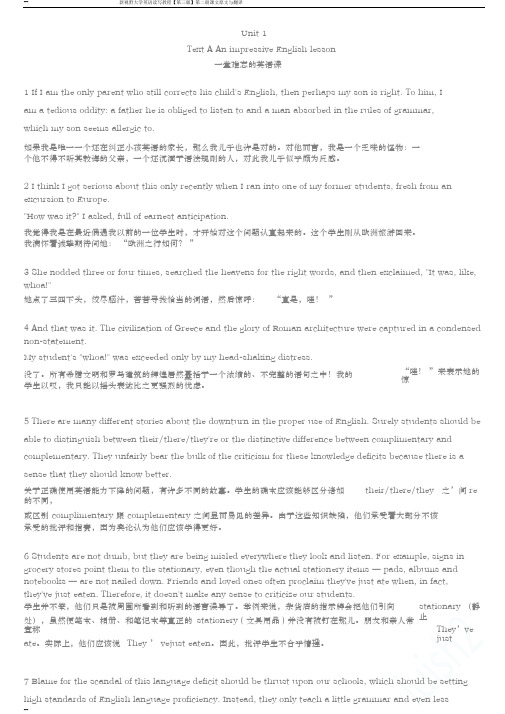
Unit 1Text A An impressive English lesson一堂难忘的英语课1 If I am the only parent who still corrects his child's English, then perhaps my son is right. To him, Iam a tedious oddity: a father he is obliged to listen to and a man absorbed in the rules of grammar,which my son seems allergic to.如果我是唯一一个还在纠正小孩英语的家长,那么我儿子也许是对的。
对他而言,我是一个乏味的怪物:一个他不得不听其教诲的父亲,一个还沉湎于语法规则的人,对此我儿子似乎颇为反感。
2 I think I got serious about this only recently when I ran into one of my former students, fresh from an excursion to Europe."How was it?" I asked, full of earnest anticipation.我觉得我是在最近偶遇我以前的一位学生时,才开始对这个问题认真起来的。
这个学生刚从欧洲旅游回来。
我满怀着诚挚期待问她:“欧洲之行如何?”3 She nodded three or four times, searched the heavens for the right words, and then exclaimed, "It was, like, whoa!"她点了三四下头,绞尽脑汁,苦苦寻找恰当的词语,然后惊呼:“真是,哇!”4 And that was it. The civilization of Greece and the glory of Roman architecture were captured in a condensed non-statement.My student's "whoa!" was exceeded only by my head-shaking distress.没了。
(完整版)第三版新视野大学英语第二册课文翻译

Unit 1An impressive English lesson1 If I am the only parent who still corrects his child's English, then perhaps my son is right. To him, I am a tedious oddity: a father he is obliged to listen to and a man absorbed in the rules of grammar, which my son seems allergic to.2 I think I got serious about this only recently when I ran into one of my former students, fresh from an excursion to Europe. "How was it?" I asked, full of earnest anticipation.3 She nodded three or four times, searched the heavens for the right words, and then exclaimed, "It was, like, whoa!"4 And that was it. The civilization of Greece and the glory of Roman architecture were captured in a condensed non-statement. My student's "whoa!" was exceeded only by my head-shaking distress.5 There are many different stories about the downturn in the proper use of English. Surely students should be able to distinguish between their/there/they're or the distinctive difference between complimentary and complementary. They unfairly bear the bulk of the criticism for these knowledge deficits because there is a sense that they should know better.6 Students are not dumb, but they are being misled everywhere they look and listen. For example, signs in grocery stores point them to the stationary, even though the actual stationery items — pads, albums and notebooks —are not nailed down. Friends and loved ones often proclaim they've just ate when, in fact, they've just eaten. Therefore, it doesn't make any sense to criticize our students.7 Blame for the scandal of this language deficit should be thrust upon our schools, which should be setting high standards of English language proficiency. Instead, they only teach a little grammar and even less advanced vocabulary. Moreover, the younger teachers themselves evidently have little knowledge of these vital structures of language because they also went without exposure to them. Schools fail to adequately teach the essential framework of language, accurate grammar and proper vocabulary, while they should take the responsibility of pushing the young onto the path of competent communication.8 Since grammar is boring to most of the young students, I think that it must be handled delicately, step by step. The chance came when one day I was driving with my son. As we set out on our trip, he noticed a bird in jerky flight and said, "It's flying so unsteady." I carefully asked, "My son, how is the bird flying?" "What's wrong? Did I say anything incorrectly?" He got lost. "Great! You said incorrectly instead of incorrect. We use adverbs to describe verbs. Therefore, it's flying so unsteadily but not so unsteady."9 Curious about my correction, he asked me what an adverb was. Slowly, I said, "It's a word that tells you something about a verb." It led to his asking me what a verb was. I explained, "Verbs are action words; for example, Dad drives the truck. Drive is the verb because it's the thing Dad is doing."10 He became attracted to the idea of action words, so we listed a few more: fly, swim, dive, run. Then, out of his own curiosity, he asked me if other words had names for their use and functions. This led to a discussion of nouns, adjectives, and articles. Within the span of a 10-minute drive, he had learned from scratch to the major parts of speech in asentence. It was painless learning and great fun!11 Perhaps, language should be looked upon as a road map and a valuable possession: often study the road map (check grammar) and tune up the car engine (adjust vocabulary). Learning grammar and a good vocabulary is just like driving with a road map in a well-conditioned car.12 The road map provides the framework and guidance you need for your trip, but it won't tell you exactly what trees or flowers you will see, what kind of people you will encounter, or what types of feelings you will be experiencing on your journey. Here, the vocabulary makes the journey's true colors come alive! A good vocabulary enables you to enjoy whatever you see as you drive along. Equipped with grammar and a good vocabulary, you have flexibility and excellent control. While the road map guides your journey to your destination, an excellent vehicle helps you to fully enjoy all of the sights, sounds and experiences along the way.13 Effective, precise, and beneficial communication depends upon grammar and a good vocabulary, the two essential assets for students, but they are not being taught in schools.14 Just this morning, my son and I were eating breakfast when I attempted to add milk to my tea. "Dad," he said, "If I were you, I wouldn't do that. It's sour."15 "Oh my!" I said, swelling with pride toward my son, "That's a grammatically perfect sentence. You used were instead of was."16 "I know, I know," he said with a long agreeable sigh. "It's the subjunctive mood."17 I was, like, whoa!Translation一堂难忘的英语课1 如果我是唯一一个还在纠正小孩英语的家长,那么我儿子也许是对的。
- 1、下载文档前请自行甄别文档内容的完整性,平台不提供额外的编辑、内容补充、找答案等附加服务。
- 2、"仅部分预览"的文档,不可在线预览部分如存在完整性等问题,可反馈申请退款(可完整预览的文档不适用该条件!)。
- 3、如文档侵犯您的权益,请联系客服反馈,我们会尽快为您处理(人工客服工作时间:9:00-18:30)。
新视野 大学英语
Para. 2a 在他自愿参军后不久,他收到了一 本这位女子寄来的书。随书而来的还有一封 信,祝他勇敢和平安。他发现自己很多参军 的朋友也收到了这位名叫霍利斯 · 梅内尔的 女子寄来的同样的书。
新视野 大学英语
Para. 2b 他们所有的人都从中获得了勇气, 也感激她对他们为之战斗的事业的支持,但 只有他给梅内尔女士回了信。在他启程前往 海外战场战斗的那天,他收到了她的回信。 站在即将带他进入敌人领地的货船甲板上, 他一遍又一遍地读着她的来信。
Para. 4a 但当他向她索要照片时,她却婉 然拒绝。她解释道:“如果你对我的感情 是真实和真诚的,那么我长什么样又有什 么关系呢。假如我很漂亮,我会因为觉得 你爱的只是我的美貌而时时困扰,那样的 爱会让我厌恶。
新视野 大学英语
Para. 4b 假如我相貌平平,那我又会常常害怕 你只是出于寂寞和别无他选才给我写信的。不 管是哪种情况,我都会阻止自己去爱你。当你 来纽约见我时,你可以做出自己的决定。记住, 那时候我们两个人都可以自由选择停止或继续 下去——如果那是我们的选择······”
新视野 大学英语
Para. 11 “不过爸爸,你这话讲得太难 听了,” 盖尔说。 Para. 12 “那么干吗要这样着急?” 他 重复地问。
新视野 大学英语
Para. 13 “马克是有公民身份方面的问题, 但他总是在自己处理这些问题,” 盖尔辩 解道。“事实上,当我们在讨论结婚的时 候,他清楚地表明了一点:如果我对任何 事情有怀疑, 我完全可以取消我们的计划。”
新视野 大学英语
Para. 14 她父亲开始引用统计数据说明异 族通婚的离婚率比同族结婚的要高,而且 还列举了接受过他咨询的、在婚姻上有麻 烦的异族通婚夫妇的例子。 Para. 15 他问道:“你考虑过你将来的孩 子可能会遭受的苦难吗?”
新视野 大学英语
Para. 16 “爸爸,你是种族主义者吗?” Para. 17 “不,当然不是。但你必须得现 实一点。” Para. 18 “也许我们的孩子会遇到一些问 题。但谁的孩子不会呢?可是有一样东西 他们将会永远拥有,那就是我们的爱。”
新视野 大学英语
Para. 7b 是的,我的朋友们会说闲话。 有些朋友甚至对你所做的事表示震惊。但 他们的生活与我们的不同。因此你要明白, 马克的肤色不是问题。我最大的担心是你 也许跟我当初嫁给你爸爸一样,为了错误 的原因而嫁给马克。
新视野 大学英语
Para. 7c 当年我和你爸爸相遇时,在我眼中, 他可爱、 聪明、富有魅力又善解人意。一切都 是那么新鲜、那么令人兴奋。而且我们两人都 认为,我们的婚姻是理想婚姻,至少表面上看 是如此,而且一切迹象都表明我们的婚姻会天 长地久。直到后来我才明白,在我们结婚时, 我并不十分理解我所爱的人——你的爸爸。”
新视野 大学英语
Para. 5 因此,我们千方百计地节约时间。我们发明了一系列节省劳力的 装置;我们通过发传真、打电话或发电子邮件与他人迅速地进行交流, 而不是通过直接接触。虽然面对面接触令人愉快,但却要花更多的时间, 尤其是在马路上交通拥挤的时候。因此,我们把大多数个人拜访安排在 下班以后的时间里或周末的社交聚会上。
新视野 大学英语
Para. 4a 许多夫妻因为错误的理由结了婚, 结果在 10 年、20 年或 30 年后才发觉他 们原来是合不来的。他们在婚前几乎没有 花时间去互相了解,他们忽视了严重的性 格差异,指望婚姻会自然而然地解决各种 问题。我们希望避免重蹈覆辙。
新视野 大学英语
Para. 4b 事实更说明了这一点:已经结 婚 35 年的盖尔的父母正经历着一场充满 怨恨、令人痛苦的婚变,这件事给盖尔 带来了很大打击, 并一度给我们正处于萌 芽状态的关系造成了负面影响。
新视野 大学英语
Para. 3b 在公共用餐场所,人们都等着别人尽快吃完,以便他们也 能及时用餐,按时赶回去工作。你还会发现司机开车很鲁莽,人们推 搡着在你身边过去。你会怀念微笑、简短的交谈以及与陌生人的随意 闲聊。不要觉得这是针对你个人的,这是因为人们都非常珍惜时间, 而且也不喜欢他人“浪费”时间到不恰当的地步。
新视野 大学英语
真爱的考验
Para. 1a 大中央车站问询处桌子上方的数 字钟显示:差六分六点。约翰 · 布兰福德, 一个年轻的高个子军官,眼睛盯着大钟, 看确切的时间。
新视野 大学英语
Para. 1b 六分钟后,他将见到一位在过 去 13 个月里在他生命中占有特殊位置的 女人,一个他素未谋面、却通过书信始 终给予他力量的女人。
新视野 大学英语
Para. 6a 就我们而言,电子交流的缺乏人情味与我们手头上事情 的重要性之间很少有或完全没有关系。在有些国家, 如果没有目 光接触,就做不成大生意,这需要面对面的交谈。
新视野 大学英语
Para. 6b 在美国,最后协议通常也需要本人签字。然而现在人们 越来越多地在电视屏幕上见面,开远程会议不仅能解决本国的问 题,而且还能通过卫星解决国际问题。
新视野 大学英语
Para. 7 美国无疑是一个电话王国。几乎每个人都在用电话做生意、与朋 友聊天、安排或取消社交约会、表达谢意、 购物和获得各种信息。电话 不但能免去走路之劳,而且还能节约大量时间。其部分原因在于这样一 个事实:美国的电话服务是一流的,而邮政服务的效率则差一些。
新视野 大学英语
Para. 8a 有些初来美国的人来自文化背景不同的其他国家,在他们的国 家,人们认为工作太快是一种失礼。在他们看来,如果不花一定时间来 处理某件事的话,那么这件事就好像是无足轻重的,不值得给予适当的 重视。因此, 人们觉得用的时间长会Para. 19 “那是理想主义的想法。人们对异族通婚 生下的孩子是会很残酷的。” Para. 20 “爸爸,到时候我们自己会操心的。但是 假如我们在做什么事之前,就必须把所有的疑难 问题全部解决的话,那么我们几乎什么都干不成 了。” Para. 21 “记住,你什么时候改变主意都不晚。”
新视野 大学英语
Para. 7 他向她迎去,完全忘记了她并没有 佩戴玫瑰。看他走来,她的嘴角露出一丝 热情的微笑。 Para. 8 “当兵的,跟我同路?” 她问道。 Para. 9 他不由自主地向她靠近了一步。然 后,他看见了霍利斯 ·梅内尔。
新视野 大学英语
Para. 10 她就站在那少女的身后,一位四十 好几的女人,头发斑斑灰白。在年轻的他的 眼里,梅内尔简直就是一块活脱脱的化石。 她不是一般的胖,粗笨的双腿移动时摇摇晃 晃。但她棕色的外衣上戴着一朵红色的玫瑰。
新视野 大学英语
Para. 2 我们之间的种族及文化差异不但增强 了我们的关系,还教会了我们要彼此宽容、 谅解和开诚布公。盖尔有时不明白为何我和 其他黑人如此关注种族问题,而我感到吃惊 的是,她好像忘记了美国社会中种族仇恨种 种微妙的表现形式。
新视野 大学英语
Para. 3 对于成为居住在美国、异族通婚 的夫妻,我和盖尔对未来没有不切实际 的幻想。相互信任和尊重才是我们俩永 不枯竭的力量源泉。
新视野 大学英语
Para. 3a 外国人对美国的第一印象很可能是:每个人都匆匆忙忙——常常处于 压力之下。城里人看上去总是在匆匆地赶往他们要去的地方,在商店里他们焦 躁不安地指望店员能马上来为他们服务,或者为了赶快买完东西,用肘来推搡 他人。白天吃饭时人们也都匆匆忙忙,这部分反映出这个国家的生活节奏。人 们认为工作时间是宝贵的。
新视野 大学英语
Para. 5 当盖尔把我们计划举办婚礼的消息 告诉家人时,她遇到了一些阻力。她的母 亲德博拉过去一直赞成我们的关系,甚至 还开过玩笑,问我们打算何时结婚,这样 她就可以抱外孙了。但这次听到我们要结 婚的消息时,她没有向我们表示祝贺,反 而劝盖尔想清楚自己的决定是否正确。
新视野 大学英语
新视野 大学英语
注重时间的美国人
Para. 1 美国人认为没有人能停止不前。如果你不求进取,你就会落伍。这种 态度造就了一个投身于研究、实验和探索的民族。时间是美国人注意节约的两 个要素之一,另一要素是劳力。
新视野 大学英语
Para. 2 人们一直说:“只有时间才能支配我们。”人们似乎是把时间当作一 个差不多是实实在在的东西来对待。我们安排时间、节约时间、浪费时间、 挤抢时间、消磨时间、缩减时间、对时间的利用作出解释;我们还要因付出 时间而收取费用。时间是一种宝贵的资源,许多人都深感人生的短暂。时光 一去不复返。我们应当让每一分钟都过得有意义。
Para. 6 “这么说我跟他约会没错, 但是如果我跟他结婚,就错了。妈 妈,是不是因为他的肤色?” 盖尔 后来告诉我她曾这样问她母亲。
新视野 大学英语
Para. 7a “首先我必须承认,刚开始时我 对异族通婚是有保留意见的,也许你甚至 可以把这称为偏见。但是当我见到马克时, 我发现他是一个既讨人喜欢又聪明的年轻 人。任何一个母亲都会因为有这样一个女 婿而感到脸上有光的。所以,这事跟肤色 没有关系。
Para. 10a 盖尔的父亲戴维—— 我还 未见过他的面—— 以知事莫若父的 态度对待我们的决定。他问的问题基 本上和盖尔母亲的问题相同:“干吗 这么匆忙? 这个马克是什么人? 他是 什么公民身份?”
新视野 大学英语
Para. 10b 当他得知我办公民身份遇 到了问题时,就怀疑我是因为想留 在美国而娶他女儿的。
新视野 大学英语
Para. 3 13 个月来,她忠实地给他写信。即使没 有他的回信,她仍然一如既往地写信给他,从 未减少过。在那段艰苦战斗的日子里,她的信 鼓励着他,给予他力量。收到她的信,他就仿 佛感到自己能存活下去。一段时间后,他相信 他们彼此相爱,就像是命运让他们走到了一起。
新视野 大学英语
新视野 大学英语
Para. 11a 绿衣少女快速地走过,很快消失在 了雾中。布兰福德觉得自己的心好像被压缩 成一个小水泥球,他多想跟着那女孩,但又 深深地向往那位以心灵真诚地陪伴他、带给 他温暖的女人;而她正站在那里。
